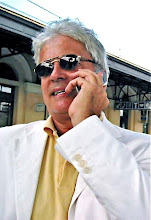D. H. Lawrence, from his
Foreword to
Sons and Lovers:
John, the beloved disciple, says, 'The Word was made Flesh.' But why should he turn things round? The women simply go on bearing talkative sons, as an answer. 'The Flesh was made Word.'
For what was Christ? He was Word, or he became Word. What remains of him? Word! No flesh remains on earth, from Christ; perhaps some carpentry he shaped with his hands retains somewhere his flesh-print; and then his word, like his carpentry, just the object that his flesh produced, is the rest. He is Word. And the Father was Flesh. For even if it were by the Holy Ghose his spirit was begotten, yet flesh cometh only out of flesh. So the Holy Ghost must either have been, or have borne from the Father, at least one grain of flesh. The Father was Flesh--and the Son, who in himself was finite and had form, became Word. For form is the Uttered Word, and the Son is the Flesh as it utters the Word, but the unutterable Flesh is the Father.
And the Word is not spoken by the Father, who is Flesh, forever unquestioned and unanswerable, but by the Son. Adam was the first Christ: not the Word made Flesh, but the Flesh made Word. Out of the Flesh cometh the Word, and the Word is finite, as a piece of carpentry, and hath an end. But the Flesh is infinite and has no end. Out of the Flesh cometh the Word, which blossoms for a moment and is no more. Out of the Flesh hath come every Word, and in the Flesh lies every Word that will be uttered. The Father is the Flesh, the eternal and unquestionable, the law-giver but not the law; whereas the Son is the mouth. And each law is a fabric that must crumble away, and the Word is a graven image that is worn down, and forsaken like the Sphinx in the desert.


